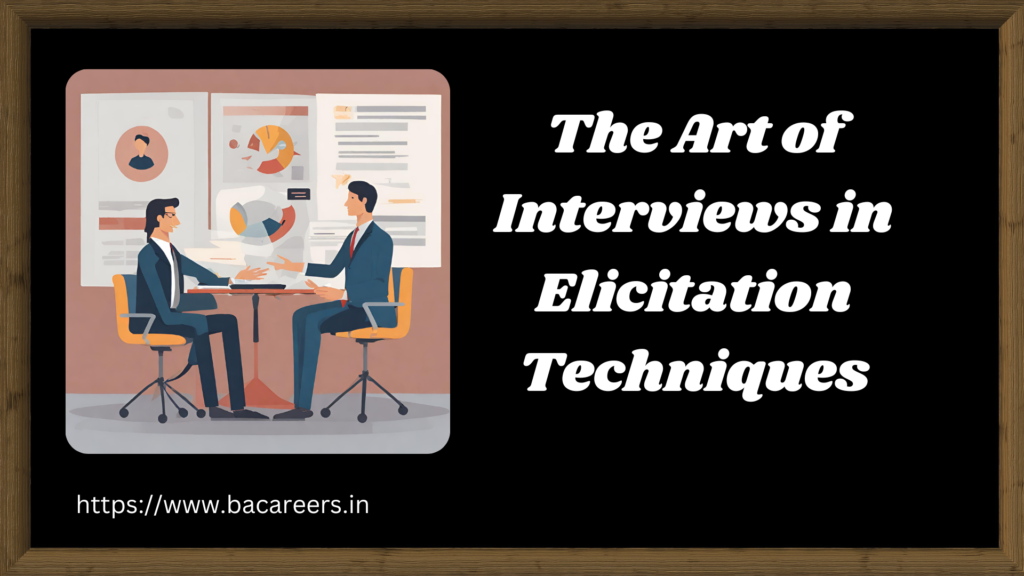Interviews
In the realm of research and data gathering, interviews stand as stalwart pillars, providing invaluable insights, perspectives, and narratives. Whether in the domain of social sciences, market research, or even investigative journalism, interviews serve as potent tools for eliciting information. Their efficacy lies not only in the questions posed but also in the nuanced art of active listening, empathy, and rapport-building. In the landscape of elicitation techniques, interviews reign supreme, offering a rich tapestry of human experiences and knowledge.

The Essence of Elicitation Techniques
Elicitation techniques encompass a diverse array of methods employed to extract information from individuals or groups. They serve as indispensable instruments in scenarios where direct access to data might be challenging or where deeper insights are required beyond surface-level observations. From structured surveys to observational studies, the spectrum of elicitation techniques is broad and multifaceted.
However, among these techniques, interviews stand out for their flexibility, adaptability, and capacity to delve into the depths of human cognition and emotion. Unlike surveys or questionnaires, interviews foster dynamic interactions, allowing for the exploration of nuanced responses, unexpected revelations, and the underlying motivations that shape behavior and decision-making.
The Anatomy of an Interviews
At its core, an interview is a structured conversation aimed at gathering information, opinions, or insights from a participant. Whether conducted in person, over the phone, or via video conferencing, the success of an interview hinges not only on the questions asked but also on the rapport established between the interviewer and the interviewee.
A well-executed interview follows a strategic framework, typically comprising several key stages:
- Preparation: This phase involves defining the objectives of the interview, identifying the target audience, and crafting a set of questions tailored to elicit the desired information. It also entails researching the topic at hand to ensure informed inquiry and relevance.
- Introduction and Rapport Building: The opening moments of an interview are crucial for setting the tone and establishing rapport. A warm greeting, a brief explanation of the interview’s purpose, and an invitation for the participant to share their thoughts help create a conducive atmosphere for open dialogue.
- Questioning: The heart of the interview lies in the art of questioning. Open-ended inquiries encourage expansive responses, while probing questions delve deeper into specific areas of interest. Active listening skills play a pivotal role here, allowing the interviewer to follow up on interesting leads, clarify ambiguous points, and navigate the conversation fluidly.
- Active Listening and Empathy: Beyond the words spoken, interviews involve deciphering the subtext, reading nonverbal cues, and empathizing with the interviewee’s perspective. Attentive listening fosters empathy, trust, and mutual understanding, paving the way for candid revelations and authentic insights.
- Closure: As the interview draws to a close, it’s essential to express gratitude for the participant’s time and contributions. Providing an opportunity for the interviewee to ask questions or share additional insights demonstrates respect and reinforces the collaborative nature of the exchange.
The Power of Interviews in Elicitation
Interviews wield immense power in eliciting rich, contextually nuanced data across a myriad of disciplines:
- Qualitative Research: In fields such as anthropology, sociology, and psychology, interviews serve as primary instruments for qualitative inquiry. They offer researchers a window into the lived experiences, beliefs, and cultural contexts that shape human behavior.
- Market Research: In the realm of business and marketing, interviews provide invaluable insights into consumer preferences, purchasing behavior, and market trends. By engaging directly with customers, businesses can tailor their products and services to meet evolving demands effectively.
- Investigative Journalism: Journalists harness the power of interviews to uncover untold stories, unearth hidden truths, and hold power to account. Through in-depth interviews with sources, reporters shed light on complex issues, challenge prevailing narratives, and amplify marginalized voices.
- User Experience Design: In the realm of design thinking and user experience (UX) research, interviews help designers understand the needs, desires, and pain points of end-users. By soliciting feedback directly from target audiences, designers can iterate on prototypes, optimize user interfaces, and create products that resonate deeply with their intended users.
Challenges and Ethical Considerations
While interviews offer a wealth of insights, they also present challenges and ethical considerations. Ensuring confidentiality, obtaining informed consent, and mitigating power imbalances are essential aspects of ethical interviewing practices. Moreover, interviewers must guard against biases, maintain objectivity, and strive for inclusivity to ensure the integrity and validity of the data collected.
Conclusion
In the ever-expanding landscape of elicitation techniques, interviews stand as venerable tools for unlocking the mysteries of human thought, behavior, and experience. Through strategic inquiry, active listening, and empathetic engagement, interviewers can unearth a treasure trove of insights that transcend mere data points, offering profound glimpses into the complexities of the human condition. As we navigate the intricacies of research, journalism, design, and beyond, let us harness the power of interviews to illuminate the path forward with wisdom, empathy, and understanding.
Important Articles :
- What is Brainstorming Meaning
- What is Brainstorming Technique
- What is brainstorming?
- Unveiling the Art of Requirement Elicitation Techniques
- 9 Elicitation Techniques Used By Business Analysts

Business Analyst , Functional Consultant, Provide Training on Business Analysis and SDLC Methodologies.
Leave a Reply